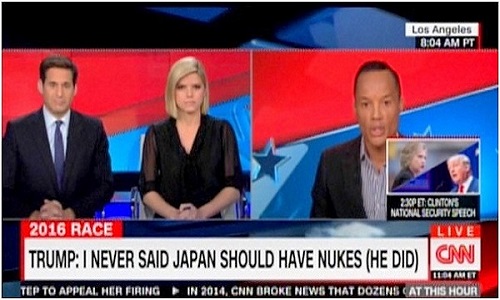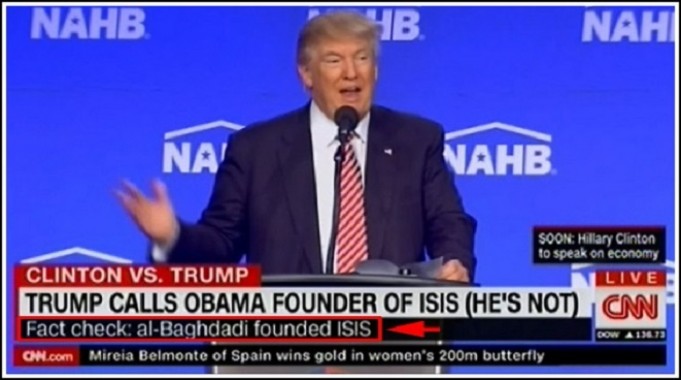Is Trump a victim of media bias?
Washington – The Republicans have long criticized the US media for favouring the Democratic Party but in this presidential election, Donald Trump has accused journalists of outright bias and tendentious reporting
Several commentators and experts, including a few from the liberal wing, are weighing in and some have acknowledged that Trump does get a sharper scrutiny than Democratic nominee Hillary Clinton, sometimes for similarly outrageous comments and claims.
It is as if large sections of “objective” journalists have decided to come to the rescue of the country and save it from a possible Trump presidency. Clinton, Trump supporters claim, doesn’t get the third degree that he does even though a majority of Americans view her as “untrustworthy.”
Jim Rutenberg, media columnist for The New York Times, wrote earlier this month that “covering Mr. Trump as an abnormal and potentially dangerous candidate is more than just a shock to the journalistic system.” It has given an advantage to Clinton who rarely does a press conference and “should draw plenty more tough-minded coverage.”
The New York Times recently came in for criticism for raising Trump’s comment about asking the Russians to find Clinton’s “missing” e-mails to high treason. Trump’s comments, which he said were “sarcastic,” came after reports that Russian hackers may have been behind the Wikileaks e-mail dump about the Democratic National Committee, which showed that party officials were actively plotting against rival Bernie Sanders.
The New York Times story gave the impression that Trump was inviting the Russians to hack into the FBI and release the missing e-mails. It concluded that “the Republican nominee basically urged Russia, an adversary, to conduct cyber-espionage against a former secretary of state.”
That Trump is an “agent” of Russian President Vladimir Putin has become a small cottage industry in the media, a line of questioning promoted relentlessly on cable television both by pro-Clinton analysts and independent experts.
Since Putin is a widely despised figure in Washington, most commentators assume that he is trying to subvert the US presidential election via Trump. Popular website Politico has run several stories with headlines similar to “Why Russia is Rejoicing over Trump.”
What the media has relinquished in the process is its right to question the hard-wired orthodoxies of Washington about Russia. It appears that even a suggestion by Trump that he would get along with Putin really unacceptable to the media elite.
Instead, major newspapers and political websites appear satisfied with the literal fact-checking of claims by the candidate. Lately a few cable TV networks have also joined in.

CNN and MSNBC recently began using parentheses in their chyrons – headlines at the bottom of the screen – to correct Trump’s claims. Consequently his assault on the media as “crooked” has intensified.
When Trump called President Barack Obama “the founder of ISIS” last week, the headline was followed by “he’s not” in parenthesis. It led to hours of debate between TV anchors and Trump supporters as to what exactly Trump meant by that claim.
Did he mean that Obama and Clinton signed papers founding a terrorist organization – an absurd assumption -- or was the candidate talking about their policies that may have led to the expansion of a group that now is seen as the biggest threat? It is a fact that Obama dismissed ISIS in 2014 as a “JV team” or junior varsity squad and downplayed the threat in an interview to The Atlantic magazine.
Joe Concha, media reporter for The Hill newspaper, which reports on the US Congress, asked if it was right to end the debate at Trump’s claim. He said “not exploring the actual issue (massive ISIS expansion) is either disingenuous, lazy, biased or all of the above.”
Similarly, Trump’s casual incitement to gun owners to take matters into their hands if Clinton were elected was rightly condemned but most reports failed to mention a similar remark by Clinton in 2008 when she was running against Obama and trailing badly. She had justified her decision to continue running in the Democratic primary by pointing out that Robert Kennedy had been assassinated in 1968, implying that Obama could be too.
Glenn Greenwald, a left-leaning reporter and columnist who reported extensively for The Guardian on Edward Snowden’s revelations, said in an interview with Slate that the US media is “essentially 100 percent united, vehemently against Trump and preventing him from being elected president.”
He added that while he didn’t have an “actual problem” with it because he shared the “premises on which it is based” that Trump poses extreme dangers, but it doesn’t mean that as a journalist or as a citizen he would along with any claim in order to bring Trump down.
Greenwald compared US media’s penchant to defeat Trump to the British media’s coverage of Brexit. “U.K. elites were uniform, uniform, in their contempt for the Brexit case, other than the right-wing Murdochian tabloids. They sat on Twitter all day long, from left to the right, all reinforced each other about how smart and sophisticated they were.”
“Everyone they were talking to – which is themselves -- agreed with them,” he said. It was an echo chamber, which shut out the people whose were suffering. UK media also told people they were playing into Putin’s game because he wanted to undermine the European Union.
Those who voted for Brexit and will vote for Trump are driven by economic hardship and fear of immigrants and hardly care about what Putin might be doing in Ukraine.
Whipping up the Putin factor in a US presidential election is especially worrisome because of the Cold War history. What’s ironical is that it is usually the right that demonises the left for being soft on Russia but today it is largely the liberal media that is attacking Trump for suggesting that tensions with Russia should be reduced and the US shouldn’t be meddling in Ukraine.
In the end, the hyping of Trump’s extreme comments – whether on gun control, foreign policy or abortion – may help the candidate establish that the media is against him and the system is rigged, making him a more sympathetic figure in the eyes of some.







